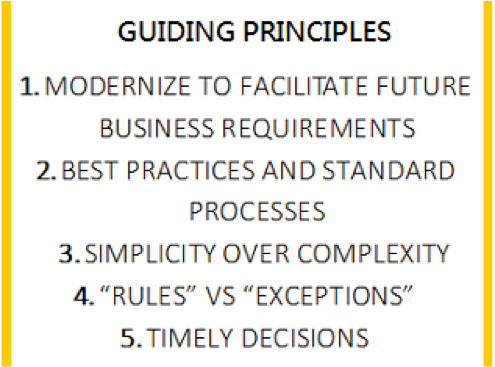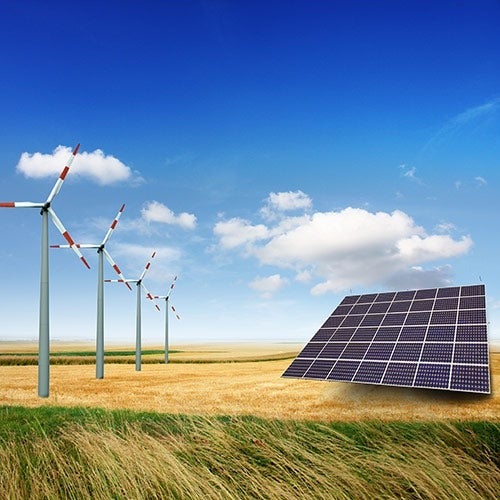Editor:
Brandon Sweet
University Communications
bulletin@uwaterloo.ca
An update on the Financial System Implementation Project
A message from the financial system project team.
As the hot, dry days of summer come to a close, the financial system project team has been hard at work and would like to highlight all the progress they’ve made over the last few months.

The Guiding Principles were very helpful in making timely decisions, emphasizing simplicity, and focusing on the “rule” rather than every exception case as we worked through the solution design workshops with the external solution architect.
The first week of August brought a series of introductory workshops for interface partners and the general campus financial community. The session outlined the project, its status, and introduced the relational database structure of the Unit4 system with some illustrative examples. A recording of this presentation is available online and a link can be found on the Project Updates and News Articles page of the project website.
The external consultants have also commenced training the financial system administrators and core process owners on setting up and configuring the system.
Now that the foundational pieces are nearing completion, scoping discussions have also begun with the partners on campus who have systems that directly interface with the current financial system.
What’s Next?
The project remains on schedule for the May 1, 2017 go-live and the project leadership would like to thank the project team for the significant time and effort each has put in over the summer months to keep everything on track.
The core project team is working through the build cycle in each of the transaction streams with the external consultants as we configure a preliminary prototype of the system.
Stay tuned to the Financial System Implementation website project updates.
Waterloo Chemistry's battery innovations keep going and going

Chemists at the University of Waterloo have developed a long-lasting zinc-ion battery that costs half the price of current lithium-ion batteries and could help enable communities to shift away from traditional power plants and into renewable solar and wind energy production.
Professor Linda Nazar and her colleagues from the Faculty of Science at Waterloo made the important discovery, which appears in the journal Nature Energy.
The battery uses safe, non-flammable, non-toxic materials and a pH-neutral, water-based salt. It consists of a water-based electrolyte, a pillared vanadium oxide positive electrode and an inexpensive metallic zinc negative electrode. The battery generates electricity through a reversible process called intercalation, where positively-charged zinc ions are oxidized from the zinc metal negative electrode, travel through the electrolyte and insert between the layers of vanadium oxide nanosheets in the positive electrode. This drives the flow of electrons in the external circuit, creating an electrical current. The reverse process occurs on charge.
The cell represents the first demonstration of zinc ion intercalation in a solid state material that satisfies four vital criteria: high reversibility, rate and capacity and no zinc dendrite formation. It provides more than 1,000 cycles with 80 per cent capacity retention and an estimated energy density of 450 watt-hours per litre. Lithium-ion batteries also operate by intercalation—of lithium ions—but they typically use expensive, flammable, organic electrolytes.
“The worldwide demand for sustainable energy has triggered a search for a reliable, low-cost way to store it,” said Nazar, a Canada Research Chair in Solid State Energy Materials and a University Research Professor in the Department of Chemistry. “The aqueous zinc-ion battery we’ve developed is ideal for this type of application because it’s relatively inexpensive and it’s inherently safe.”
The global market for energy storage is expected to grow to $25 billion in the next 10 years. The bonus for manufacturers is they can produce this zinc battery at low cost because its fabrication does not require special conditions, such as ultra-low humidity or the handling of flammable materials needed for lithium ion batteries.
“The focus used to be on minimizing size and weight for the portable electronics market and cars,” said Dipan Kundu, a postdoctoral fellow in Nazar’s lab and the paper’s first author. “Grid storage needs a different kind of battery and that’s given us license to look into different materials.”
Water in the electrolyte not only facilitates the movement of zinc ions, it also swells the space between the sheets, like tiers of a wedding cake, giving the zinc just enough room to enter and leave the positive structure as the battery cycles. The electrode material’s nano-scale dimensions and the battery’s high-conductivity aqueous electrolyte also improve its cycling life and response times.
Together with researchers at the Joint Center for Energy Storage Research in the U.S., Nazar’s team is also investigating multivalent ion intercalation batteries based on Mg2+ in non-aqueous electrolytes. They were the first to report highly reversible Mg cycling in the TiS2 thiospinel and layered sulfides, which represent the first new highly functional Mg insertion materials reported in more than 15 years. Their papers appeared in Energy & Environmental Science and ACS Energy Letters earlier this year.
Arts Undergraduate Office closed at lunch today
The Arts Undergraduate Office (AUO) will be closed from 12:00 p.m. to 1:30 p.m. today.
Link of the day
When and where
Single and Sexy premiere performance, Friday, September 2, 10:00 a.m., PAC gym.
International Student Orientation, Friday, September 2 to Sunday, September 4.
Orientation 2016, Sunday, September 4 to Saturday, September 10.
Out-of-province/American Orientation, Sunday, September 4.
Family Welcome, Sunday, September 4 and Monday, September 5.
Family Send-Off, Sunday, September 4 and Monday, September 5, 2:00 p.m. to 3:15 p.m.
Labour Day holiday, most University operations closed, Monday, September 5.
Exchange/Study Abroad Orientation, Monday, September 5.
Transfer Student Orientation, Monday, September 5.
Graduate Student Orientation, Tuesday, September 6.
Lectures begin, Thursday, September 8.
AutoTech Symposium, Tuesday, September 13, 8:00 a.m. to 7:00 p.m., Federation Hall.
The Writing Centre presents "Professionalism in your communication: How to talk to your professors," Tuesday, September 13, 10:00 a.m. to 12:00 p.m.
2016 Waterloo Innovation Summit, Wednesday, September 14 to Friday, September 16.
Fall Farm Market, Thursday, September 15, 9:00 a.m. to 1:00 p.m., Student Life Centre Lower Atrium.
Writing Centre presents "STEM lab reports: Improve your lab report writing," Thursday, September 15, 1:00 p.m.
WaterTalks series: Peter van der Zaag, "Water Storage: Nature-based Solutions for Resilient Communities", Thursday, September 15, 2:30 p.m. - 3:30 p.m., Davis Center, Room 1304.
Waterloo Centre for German Studies presents "Von Berlin to Kitchener: Connotations and Cultures, A Discussion Panel", Thursday, September 15, 7:00 p.m., Kitchener Public Library.
Doors Open Waterloo Region, Friday, September 16 to Saturday, September 17.
September Senate meeting, Monday, September 19, 3:30 p.m., NH 3407.
UWRC Book Club featuring House in the Sky by Amanda Lindhout, Wednesday, September 21, 12:00 p.m., LIB 407.
Fall Farm Market, Thursday, September 22, 9:00 a.m. to 1:00 p.m., Student Life Centre Lower Atrium.
Feds Clubs and Societies Days, Thursday, September 22, 11:00 a.m. to 6:00 p.m., Student Life Centre Great Hall.
Research Talks event featuring Linda Nazar, "New vistas in electrochemical energy storage," Friday, September 23, 12:00 p.m., QNC 0101.
Further Education Boot Camp, Saturday, September 24.
Fall Farm Market, Thursday, September 29, 9:00 a.m. to 1:00 p.m., Student Life Centre Lower Atrium.